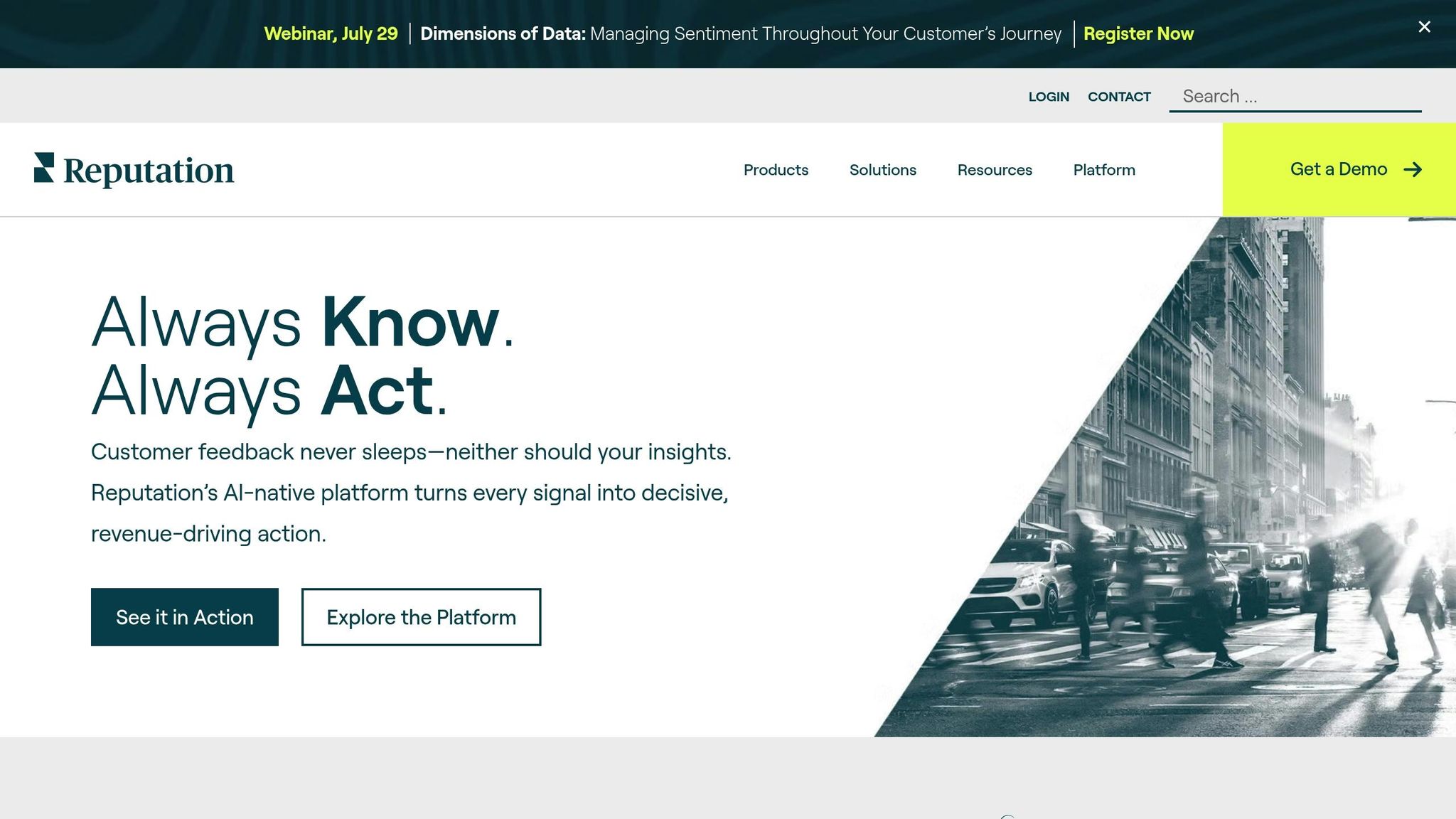Your dealership’s online reputation directly impacts your revenue. In today’s car-buying process, 84% of customers trust online reviews as much as personal recommendations, and a dealership with a 4.5+ star rating generates 70% more leads compared to lower-rated competitors. With 95% of buyers researching online before visiting a dealership, maintaining a strong reputation is non-negotiable.
Here’s what you need to know:
- Positive reviews drive revenue: A single-star increase can boost revenue by 5–9%.
- Negative reviews hurt sales: Poor ratings can cost you up to 70% of potential customers.
- AI tools simplify review management: AI tracks reviews, analyzes sentiment, and automates responses, helping dealerships stay ahead without overwhelming their teams.
- Customer expectations are high: 74% of buyers expect at least a 4-star rating, while 93% of Gen Z shoppers rely on reviews to choose a dealership.
AI-powered tools like VisQuanta’s AutoMaster Suite streamline review management, improve customer satisfaction, and protect dealership valuations. With features like real-time review monitoring, sentiment analysis, and automated responses, dealerships can address feedback promptly and improve their online presence - leading to more leads and higher revenue.
Using AI for Review Management
How Online Reviews Impact Dealership Performance
In today’s digital age, online reviews play a pivotal role in shaping a dealership’s revenue. By understanding how these reviews influence customer behavior and financial outcomes, dealerships can focus on strategies that improve their reputation and, ultimately, their bottom line.
The Financial Impact of Positive and Negative Reviews
The numbers don’t lie - online reputation directly affects dealership performance. A single-star increase in a dealership’s rating can lead to a revenue boost of 5–9% [10]. For a dealership generating $50 million annually, that means an additional $2.5 to $4.5 million in revenue. Similarly, dealerships that raised their Reputation Score by 150 points between 2022 and 2023 experienced a 10% jump in sales [4]. This highlights how positive customer feedback translates into measurable financial gains.
On the flip side, negative reviews can have a major financial impact. Dealerships risk losing 21.9% to 69.9% of potential customers due to poor reviews [11]. Take a dealership converting 100 leads per month: a drop in reputation could cost them 22 to 70 sales. With an average gross profit of $2,000 per vehicle, that’s a potential loss of $44,000 to $140,000 every month.
A stellar online reputation not only drives sales but also enhances a dealership’s valuation. A 5-star reputation can add a 5–10% premium over the baseline valuation [3]. For a dealership valued at $10 million, this increase equates to an added $500,000 to $1 million. Investing in reputation management tools can also deliver a significant return - up to 32 times the initial investment [5]. Beyond the numbers, a strong reputation acts as organic advertising, reducing the need for additional marketing spend [3].
These financial shifts underscore the importance of meeting evolving customer expectations.
What U.S. Car Buyers Expect from Dealerships
The way Americans shop for cars has fundamentally changed. Today, 95% of car buyers rely on online research, with reviews being a top factor in deciding which dealership to visit [6]. This digital-first approach means that maintaining a strong online presence is no longer optional - it’s essential.
Research shows that 78% of buyers read at least six reviews before deciding on a vehicle, and 64% check dealership reviews before stepping onto a lot [7]. As Joe Fuca, CEO of Reputation, puts it:
"A car is one of the most significant purchases many consumers make, and a highly emotional one. People are willing to pay the higher prices we're seeing today, but expect a premium experience – which means where they buy their car matters now more than ever." [4]
The standard for acceptable ratings has risen sharply. Seventy-four percent of car buyers now expect dealerships to maintain at least a 4-star rating [11]. Among Gen Z buyers, 93% use reviews to guide their decisions [4]. Shoppers are particularly drawn to reviews that highlight pricing transparency, trade-in value, and a seamless buying process. These factors signal fair treatment and a hassle-free experience.
The power of reviews is evident in buyer behavior: 53% of shoppers have changed their choice of dealership or vehicle based solely on what they read online [7]. As one expert in a Cox Automotive study aptly noted:
"A dealership's reputation is its currency now." [7]
Moreover, nearly half of customers are more likely to return to a dealership when they see that the business responds to negative reviews [2]. Today’s car buyers value authenticity, transparency, and excellent service, making online reviews a cornerstone of their decision-making process [7]. In fact, nearly every shopper - across all industries - is influenced by what they read online [8].
Dealerships that actively engage with reviews and focus on delivering exceptional service are better positioned to thrive in this competitive landscape.
How AI Improves Online Review Management for Dealerships
Handling reviews across numerous platforms can be overwhelming for dealerships. AI steps in to streamline this process, automating tasks that would otherwise demand a dedicated team. By continuously monitoring, analyzing, and responding to feedback, AI helps dealerships maintain their reputation while easing the workload on their staff.
Real-Time Review Monitoring Across Platforms
AI tools keep dealerships in the loop by instantly flagging reviews from platforms like Google My Business, Yelp, DealerRater, and Cars.com. In an industry where timing is everything, this real-time monitoring is key. Imagine a negative review popping up on a Friday evening - left unchecked, it could influence weekend shoppers researching their options. AI ensures no review is missed, regardless of when or where it’s posted.
Beyond text reviews, these systems also keep an eye on photo uploads, star ratings, and even social media mentions. This comprehensive tracking gives dealerships a full picture of their online reputation, allowing them to act quickly and decisively.
Sentiment Analysis to Identify Trends
AI doesn’t just count stars; it digs deeper to analyze the tone and emotion behind customer feedback. For instance, a three-star review might reflect mild satisfaction or genuine disappointment - AI can tell the difference by examining the language used. This sentiment analysis spans all customer touchpoints, offering dealerships a clearer understanding of how their service is perceived [12].
The real advantage lies in spotting trends. A single complaint about long wait times might not stand out, but if multiple reviews mention it over weeks, AI identifies the pattern. It highlights recurring issues, shifting customer preferences, and unmet needs that might otherwise fly under the radar [12].
Here’s the impact: businesses using sentiment analysis are 2.4 times more likely to surpass customer satisfaction goals [14]. For dealerships, this means actionable insights into specific problems - whether it’s delays in service or frustrations with digital tools. These insights allow for swift corrective action, improving the overall customer experience.
Sentiment analysis also helps dealerships stay ahead of the curve. If reviews increasingly mention digital tools or online services, it signals a growing demand for tech-driven experiences. With 73% of customers expecting businesses to understand their unique needs [14], these insights are crucial for staying competitive.
"Emotion mapping has introduced a crucial dimension to customer journey analysis. By tracking emotional patterns across touchpoints, we can identify specific moments that trigger positive or negative reactions." – CMSWire [13]
When combined with real-time monitoring, sentiment analysis equips dealerships to engage with customers more effectively and proactively.
Automated Responses for Better Customer Engagement
AI doesn’t stop at analysis - it also enhances customer interactions by generating tailored responses to reviews. Gone are the days of generic "thank you for your feedback" replies. Modern AI systems craft personalized responses that address the specifics of each review, fostering authentic connections with customers.
For example, if a customer praises a salesperson by name, the AI can acknowledge that individual’s contribution while expressing gratitude for the feedback. On the other hand, if a review highlights an issue, the AI can recognize the problem and outline steps to resolve it. These thoughtful, timely replies reinforce the dealership’s commitment to customer care.
Speed matters here. Prompt responses show attentiveness and help build trust with both current and potential customers. AI also ensures that the tone and messaging remain consistent across platforms, avoiding the variability that can occur with human responses.
For more complex or sensitive reviews, AI takes a hybrid approach - flagging them for human attention while managing routine feedback automatically. This ensures critical issues receive the care they deserve, while positive reviews are acknowledged without delay. It’s a balanced system that keeps customers feeling heard and valued.
Step-by-Step Guide: Setting Up AI for Online Review Management
Tapping into the capabilities of AI for online review management can feel like a big step, but it’s all about enhancing what you’re already doing. Here’s how to seamlessly integrate AI tools into your dealership’s existing processes to streamline reputation management.
Assess Your Current Online Reputation

Before diving into AI, take stock of where your dealership stands online. Start by identifying all the platforms where customers leave reviews - Google My Business, Yelp, DealerRater, Facebook, Cars.com, AutoTrader, and any manufacturer-specific sites.
Once you’ve listed these platforms, gather your review data. Look at overall star ratings, the volume of feedback, and recurring themes in customer comments. For instance, maybe your service department gets glowing reviews, but there’s consistent criticism about long wait times in sales. Similarly, assess how quickly and effectively your team responds to feedback. Are you addressing customer concerns in a way that feels genuine and timely?
Don’t forget to include social media platforms like Twitter, Instagram, and Facebook in your review audit. These channels often feature valuable feedback that can shape your strategy. Finally, set measurable goals - average response times, trends in ratings, and how quickly negative reviews are resolved - to track your progress once AI tools are in place. [9]
Integrate AI Tools with Existing Systems
For AI to truly improve your review management, it needs to work hand-in-hand with your current systems. Start by linking your AI tools with your CRM. This ensures that customer feedback automatically updates their profiles, giving your team a complete picture of each interaction. Integration with your dealership management system (DMS) can take things further - triggering review requests at just the right moment after a service visit or vehicle purchase.
Once the systems are connected, test them with common scenarios to ensure everything runs smoothly. Does data flow as expected? Are the tools meeting your operational needs? These steps help you catch any issues early and set a solid foundation for proactive review management.
Use AI for Automated Review Requests and Insights
With your AI system in place, it’s time to put it to work. Start small by running a pilot program in one department - service is often a good choice since it involves frequent customer interactions. This allows you to fine-tune processes and train your team on how to use the system effectively before rolling it out dealership-wide.
Clean up and organize your customer data to enable timely, personalized review requests. For example, you can reference specific services or purchases in automated messages, making the outreach feel more personal. At the same time, give customers options for how they engage - whether that’s leaving a review, completing a survey, or speaking directly with a representative.
AI doesn’t just help with outreach; it also provides insights. Use it to identify patterns in customer feedback and address recurring issues. For example, if multiple reviews mention long wait times, you can take steps to improve scheduling. Track key metrics like customer satisfaction scores and response times to measure the system’s impact.
While AI can handle a lot of the heavy lifting, human oversight is crucial. Use AI to draft initial responses to reviews, but have your team review and personalize them. As Stephane Ferri, CEO of Car Wars, wisely puts it:
"Dealerships should use AI to enhance and augment human capabilities, rather than replace them."
Finally, establish clear guidelines for AI-generated messaging. Focus on empathy, especially when addressing negative feedback, and ensure your review strategy aligns with your broader marketing efforts. By combining AI efficiency with a human touch, you’ll not only improve your dealership’s reputation but also create a more cohesive and engaging customer experience.
VisQuanta's AI Solutions for Reputation Management

VisQuanta's AutoMaster Suite provides AI-driven tools tailored for U.S. car dealerships, streamlining operations while retaining a personal touch with customers. By expanding on AI's role in review management, the AutoMaster Suite offers dealership-specific solutions that go beyond generic tools.
Features of the AutoMaster Suite
At the core of the AutoMaster Suite is ARM (Automated Reputation Management), a feature that automates review handling and customer follow-ups. What sets ARM apart is its focus on automotive industry compliance and regulatory standards, ensuring every interaction meets the unique needs of dealerships.
ARM takes care of review requests and custom replies, eliminating the need for manual follow-ups. Each response is carefully checked to align with industry guidelines and data safety protocols [16].
Real-Time Issue Alerts provide dealerships with the ability to identify and address potential problems before they escalate, helping protect their Customer Satisfaction Index (CSI) score [16]. ARM detects 95% of negative reviews early, allowing teams to resolve issues privately before factory surveys, giving dealerships a chance to directly address customer concerns [16].
The suite integrates seamlessly with existing CRM systems, ensuring customer feedback is automatically updated in profiles and triggering the necessary follow-up actions. This integration creates a comprehensive view of each customer journey, from the first interaction to post-sale services, laying the groundwork for measurable financial benefits.
Delivering ROI with AI-Driven Results
The AutoMaster Suite is designed to tackle the challenges dealerships face, offering timely and compliant solutions that improve customer satisfaction and boost sales. ARM has been shown to increase CSI scores by an average of 0.6 within just 90 days of implementation [16]. Dealerships using the suite also see a 75% rise in 4- and 5-star reviews [16], significantly enhancing their online reputation and visibility.
With an average review score of 4.9 out of 5 [16], dealerships benefit from a stronger online presence. For context, even a small increase in star ratings - from 4.0 to 4.5 - can result in 19% more leads [1], demonstrating the tangible impact on revenue.
VisQuanta's success is reflected in the $9.5 million in additional revenue generated for dealership clients nationwide. This track record proves that AI-powered reputation management is not just about safeguarding a brand but actively driving growth and profitability.
Compliance and U.S.-Focused Support
In the highly regulated automotive sector, staying compliant is non-negotiable. The AutoMaster Suite includes features like SMS compliance and legal safeguards, ensuring all customer communications are effective while adhering to regulatory requirements.
ARM ensures responsible data management throughout the reputation management process, protecting your dealership's credibility and maintaining customer trust [16]. To address the specific needs of American dealerships, VisQuanta offers U.S.-based customer support, helping navigate state regulations, manufacturer requirements, and consumer protection laws.
The suite’s compliance features include automated monitoring to prevent over-messaging, proper opt-out mechanisms for SMS communications, and data retention policies that meet automotive standards. These measures allow dealerships to focus on customer service without worrying about regulatory risks.
While compliance is a priority, the AutoMaster Suite doesn’t compromise on results. Its tools are designed to deliver efficient reputation management, ensuring dealerships achieve high performance while meeting all necessary regulations [16].
Conclusion: Building a Better Reputation with AI
In the U.S. automotive market, reputation directly impacts revenue. AI-powered tools have become a game-changer, turning online reviews into a competitive advantage for dealerships.
Key Points on AI and Reputation Management
AI takes reputation management from being a reactive process to a proactive strategy that drives revenue. For example, improving your Reputation Score by 150 points can lead to a 10% sales boost and generate seven times more Google Business actions [19]. By monitoring reviews in real time, AI tools can double or even triple the number of reviews within just a few months [18]. Additionally, keeping business listings accurate and updated can increase views by 500% compared to incomplete or outdated listings [17], translating into greater visibility and more leads.
"In today's hyper-competitive automotive sector, a great reputation is a clear strategic imperative."
- Joe Burton, CEO of Reputation [19]
The key to success lies in balancing automation with authentic customer engagement. AI can handle efficiency while still allowing customers to connect with a human when needed. This dual approach ensures that dealerships can meet modern customer expectations effectively.
Choosing the Right Tools for Your Dealership
When selecting AI tools, focus on solutions tailored to the U.S. market. These tools should integrate seamlessly with your CRM, comply with automotive industry standards, and include features like SMS opt-out and data retention to reduce regulatory risks. These safeguards allow your team to prioritize customer service without worrying about compliance issues.
Technology alone isn’t enough - it needs to be paired with ongoing training and support. The best AI platforms offer thorough employee training, helping staff see AI as a tool that enhances their work rather than replacing it. Start small with a pilot program, ensuring your data is clean and organized before scaling up to meet your dealership’s unique needs [15].
"Our reputation is not solely measured by sales volume but by the trust we cultivate through every customer interaction."
- Alan Bethke, Senior Vice President of Marketing at Subaru of America, Inc [19]
Investing in AI-driven reputation management doesn’t just improve review scores - it enhances customer satisfaction and drives revenue growth. With 90% of customers favoring text communication [18] and the industry shifting toward digital-first experiences, dealerships that embrace AI now will be better positioned for long-term success. The right AI system transforms online reviews into a powerful revenue generator.
Ultimately, your reputation is your revenue. The decision isn’t about whether to adopt AI for reputation management - it’s about partnering with the right provider to build stronger customer relationships and achieve measurable growth.
FAQs
How can AI help car dealerships manage online reviews more effectively?
AI streamlines how car dealerships handle online reviews by automating essential tasks like sending out review invitations, analyzing customer sentiment instantly, and creating tailored responses to feedback. These tools not only save time but also ensure customer interactions remain consistent and professional.
With AI, dealerships can respond to negative reviews promptly, encourage more positive feedback, and establish trust with potential buyers. This approach strengthens their reputation, draws in more leads, and ultimately boosts sales conversions.
What features should car dealerships prioritize in an AI-powered reputation management tool?
When selecting an AI-driven reputation management tool, dealerships should prioritize features designed to simplify and enhance the process of handling online reviews. Key capabilities to look for include real-time review monitoring, which keeps you updated on new feedback as it comes in, sentiment analysis to gauge customer emotions, and automated response generation for addressing feedback promptly and professionally.
Additionally, tools offering early warning systems for unhappy customers, automated review request capabilities, and detailed reputation analytics can be game-changers. These features not only help pinpoint trends and areas needing attention but also support building trust, attracting potential customers, and driving higher revenue.
How can car dealerships evaluate the ROI of using AI tools for managing their online reputation?
For dealerships, assessing the return on investment (ROI) of AI-powered reputation management tools comes down to examining the numbers that matter most. Metrics like improved customer review scores, higher Customer Satisfaction Index (CSI) ratings, and overall online reputation trends paint a clear picture of progress. These gains often translate into tangible outcomes - more customer leads, increased sales, and, ultimately, higher revenue.
Beyond these core metrics, dealerships can also monitor other key indicators, such as fewer negative reviews, quicker response times to customer feedback, and noticeable improvements in customer satisfaction. Together, these measurable results showcase the real impact of AI in streamlining reputation management and driving business growth.
.avif)











.svg)

